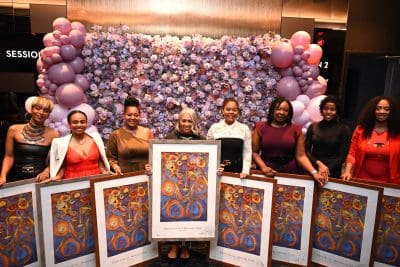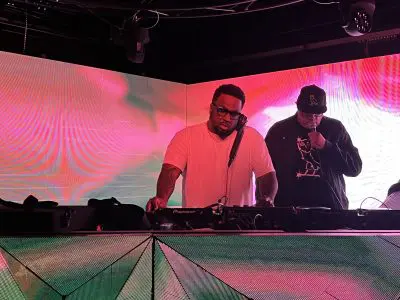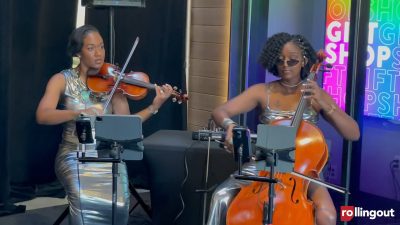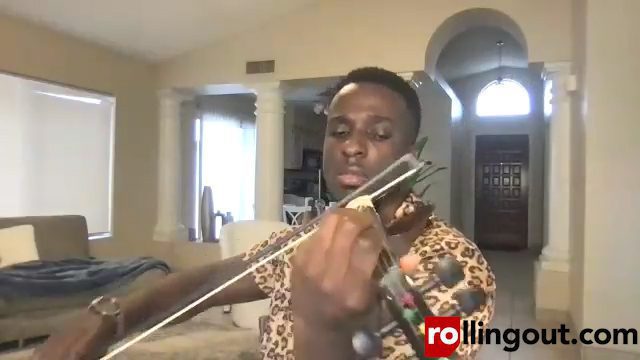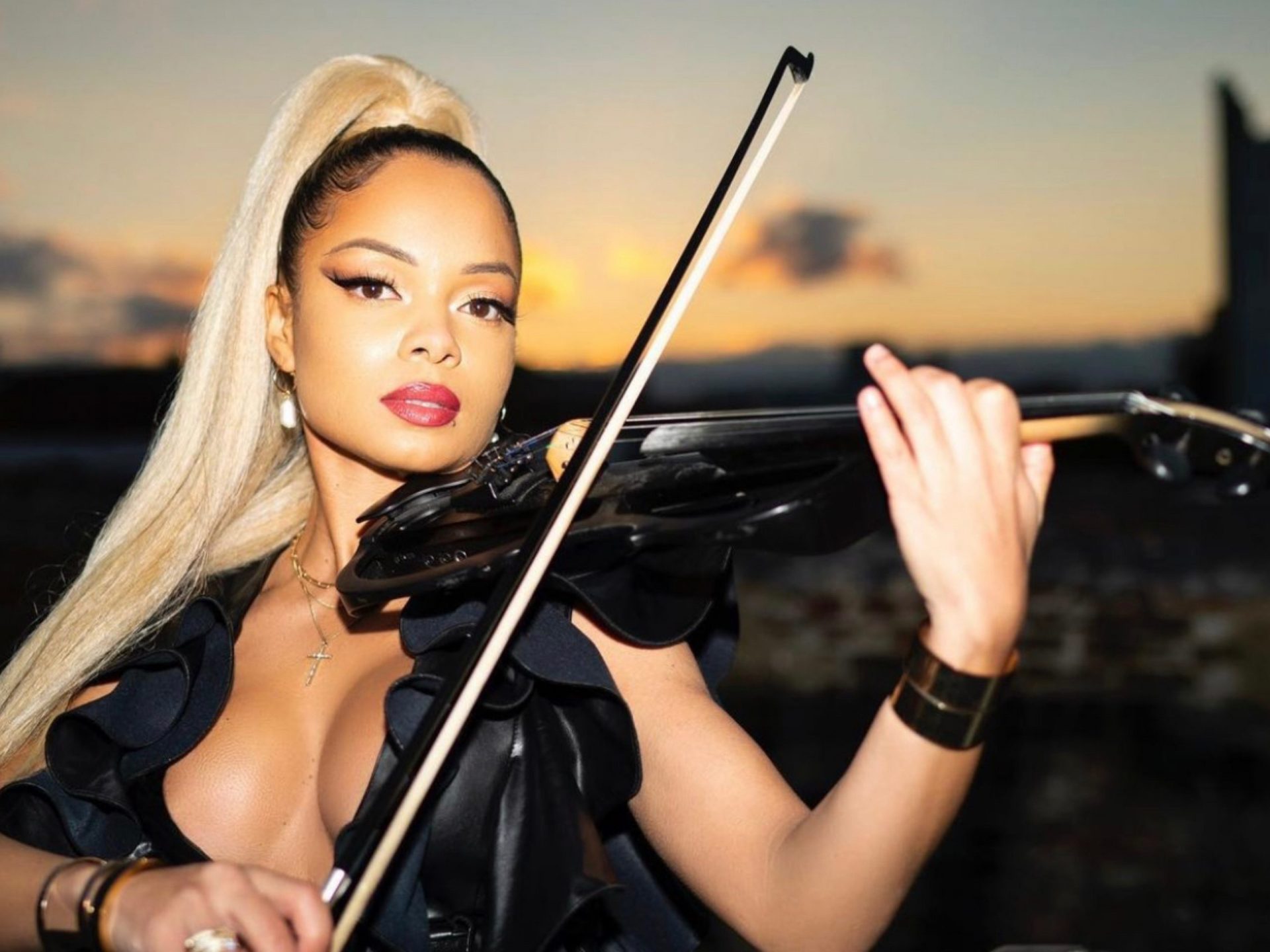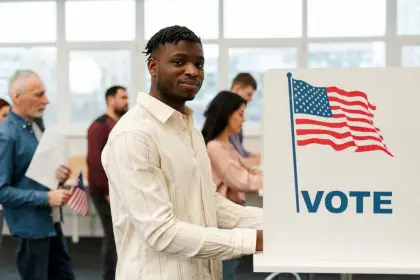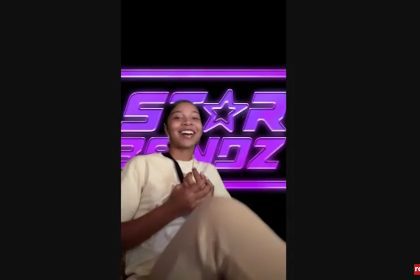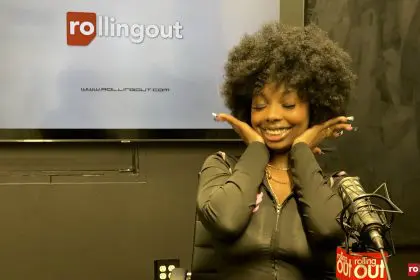
How did you arrive at this career choice? Was it a deliberate decision or a gradual and natural evolution?
Before I was born my parents dedicated my life to God as a musician. Our pastor at our church, God’s House for All Nations, had a vision that our church would one day have an orchestra to perform music to God’s glory. My parents believed in that pastor’s vision and signed me up for violin lessons — which had a five-year waiting list —- I started lessons when I was 3. The church was located right next to the Checker Board Lounge. I didn’t realize until I was 17 that the music I was raised playing in church seven nights a week was rooted in the blues and traditional African American folk music. When I was 17, I received a scholarship to study viola at Interlochen Arts Academy. There, I participated in a master class for jazz Improvisation with the vibraphone master, Milt Jackson of the Modern Jazz Quartet. When it was concluded, I asked Jackson if he felt I had sufficient skill as a musician to make a career of jazz. He told me he felt I could do it and that there weren’t enough current violinists playing jazz. That’s when I discovered my true purpose. He mentioned the names of notable jazz violinists that I never heard of: Eddie South, Stuff Smith, Ray Nance, Joe Kennedy Jr., John Blake and Regina Carter.
What separates you from others in your field? What is unique to the experience that you create?
I would say that the impetus for my creativity comes from a spiritual source. That helps me to improvise and compose from a place that is authentic and uniquely individual based upon my experiences in life. I try to provide an experience for my audiences that allows me to communicate directly to them on their terms. In other words, I tailor performances to the types of audiences that I play for. I play in a very broad context. I play for intimate venues, large festivals, private events, I even street perform like a long line of important artists from Buddy Guy to James Brown to Sonny Stitt. I consider myself a folk musician and I enjoy studying folk music from all cultures to inform my improvisation. Folk music technically includes all genres from classical music to jazz to rock to pop to soul music. The music that I compose is original to my own life experience and it blends and borrows from gospel, blues, jazz and ethnic folk music. The best example of my original composition can be found on a recording I did for Delmark Records called Running Out of Time recorded in 2003 and released in 2004.
For those considering entering this arena, what skill sets do you recommend mastering? What traits are most conducive to success?
A background in traditional classical violin technique is necessary to achieve a level of fluency on the instrument. I would also say that it is important to study jazz theory and have plenty of exposure and mentorship from dedicated jazz musicians. The most important trait is tenacity. You have to have an attitude that is fully committed and unrelenting, you can never give up, you have to live to play the instrument. I want to play every day until my last day, that’s the goal. I want to add something of significant beauty to the world everyday such that the world is a better place for the living because of it.
How do you stay at the leading edge of your craft?
I would say that I am a very curious person by nature and I am constantly seeking to learn new things about the world around me and because I’m searching for new insights. I find that new ideas come to me constantly and these ideas shape my perspective and help me to stay unique and authentic. I read a lot, all different subjects from quantum physics science to artist biographies to African history, world history, American history, politics, and sports like equestrian, archery, fencing, and martial arts. I listen to a lot of different styles of music from all over the world. I focus on specific periods in history to understand how people communicated through music at different points in human history.
Do you think that there are any widely held misconceptions about what you do? If so, what are they and how do you work to dispel them?
Yes, I think that people that hear music that they are not familiar with assume that it doesn’t take discipline and practice to develop. I hear people say all the time, “That musician is so talented!” As if to say that the gift is not something that needs to be continually developed, exercised, and practiced. I don’t believe natural talent is all that is required in order to perform at a high level. I believe it takes constant discipline, focus, perspective, insight, foresight, and awareness.
How do you map out your goals? How do you measure your success?
I usually make long lists and revise them over time based upon professional performance opportunities. So if I have a performance coming up in a classical context I make work on a list of technical things that I need to do the job and when I have time to devote specifically to my hearts passion which is jazz I get back to a separate list for a practice regimen that includes scale studies, chord progression movements, and fundamental tone production exercises. I have lists for business goals as well as family goals but I tend to prioritize based upon the main goal of making a living as a performer. I measure my own success based upon how well I’m playing technically on any given day and then by how well I can provide for my family.
Who do you consider to be your peers in your field? Who do you see or use as examples to emulate?
Well, I cut my teeth as an artist at jazz jam sessions in Chicago in the 90s – Fred Anderson’s Velvet Lounge, Von Freeman’s Apartment Lounge, among others. At that time there were a large number of young aspiring jazz musicians trying to make a name for themselves and I would say those are my peers. At that time the only other violin player on the scene I can remember was Zachery Brock. Not to say that there weren’t other violinists in other parts of the country and the world developing themselves at the same time. Later on I found out about other violin players that were growing at the same time like Christian Howes and Adam Baldych and Florin Nichelcue. I was one of the oldest musicians I can remember on the scene and often times I was the only violin player at the sessions. My peers at that time were horn players that have become very well-known and very successful now. People like Maurice Brown, Corey Wilkes, Greg Ward, David Boykins, Marquis Hill, Zachery Brock [violin], Steve Coleman, and Pharez Whitted. There were hundreds of other players I can name of different instruments that were also on the scene that I’m still friends with, that I consider my peers. I always sought out the elder jazz musicians to ask about music, history, and business to check to see if I was on track career wise and to keep from having unrealistic expectations. The elder musicians were the people that I wanted to emulate. Fred Anderson, Von Freeman, Buddy Guy, TomTom Washington, Don Moye, Ernest Dawkins, Ameen Muhammad, Vincent Davis, Ari Brown, Ann Ward, Roscoe Mitchell, Billy Bang, Kahil Elzabar, Ira Sulivan, Johnny Frigo, Joe Vito, John Baney, Don Stille, Kelly Sil, Joseph Jarmen, Reggie Willis, Malichai Favors, Bunky Green, Dennis Winslet, Reginald Robinson, Willie Pickins, Ed Wilkerson, Ray Silkman, Roy Ayers, too name a few.
Name two of your top role models: one from your industry and one from outside of it.
I need to name two musicians just because as a jazz violin player I straddle two worlds and also because I would like to include a female name, Rachel Barton Pine and Wynton Marsalis. Outside of my field, I guess, the first name that comes to mind is Jean Micheal Basquiat and Samuel L. Jackson.
Name three books, works, performances or exhibits that changed how you view life, yourself or both.
Music Recordings: 1. Giant Steps (Coltrane) 2. A Love Supreme (Coltrane) 3. The Bach Cello Suites (YoYo Ma)
Movies: 1. Mo Betta Blues 2. Straight No Chaser 3. The World According to Trane
Books: 1. Beneath the Underdog (Mingus) 2. Q 3. Pattern Master 4. The Music of Life
Why do you consider continued learning important?
It keeps me fresh and on the cutting edge.
What affirmations do you repeat to yourself that contribute to your success?
“Today, I will play something truly inspiring that will bring peace and balance to the world.” I am a “light-being” placed on this planet, in this realm of existence, by the creator to bring peace and balance through sound to the world. I am responsible for the lives of my wife and children. This is who I am. That is my purpose. I ask, “How may I be of service to you?” This is the affirmation I created to remind myself about what I believe in so that I stay grounded.
What role does technology play in your day-to-day life? How do you utilize it?
Well, I use Macintosh Hardware and a number of applications. I also use the most current amps and pedals. I haven’t had the time to really get deep into computer technology and recording software like I want to because I spend up to 15 hours a day on my instrument.
What software, app or other technological innovation has made the biggest difference in your life and/or career?
I guess, apps are what I use most to engage my audience through social media. I use shareware like drop box, and sites like bandzoogle, soundcloud, and bandcamp. These have been great resources for helping me sell my music products and merchandise.
Please define your personal brand.
When I started performing for a living in the ’90s, I was impressed by artists like Prince who had logos to represent them apart from their names. I created a brand called the universal violin which I use as a symbolic representation of me as an artist. I had experienced racial discrimination in the classical world and wanted to symbolize inclusion of all races and cultures in my logo. When you look closely at the SavoirFaire logo you will notice symbolism in the violin that represents different cultures. I got the nickname SavoirFaire from having been at all the jazz sessions in Chicago. People used to say “SavoirFaire is everywhere.” One night I was performing with my band, The SavoirFaire Jazz Quartet, in Chicago and a reporter was there to cover the event and he heard that people in the audience were chanting “SavoirFaire!” after my solos. So, that name was printed in the article the following week and that’s how I got my name. The quote “SavoirFaire is everywhere!” came from the Klondike Cat cartoon series. So, Savoirfaire means someone that knows what they’re doing or it can mean a know-it-all. It’s a tricky moniker because it cuts two ways as either being sophisticated and apropos or egomaniacal. Early on I recognized the need to develop multiple brand platforms so I began before the website bubble burst in ’97 with the domain name Jazzviolinist.com I was the first search for years under the genre at that time . I was a new jazz violin artist and it was hard to distinguish myself as a no name player at that time so I bought the domain name because I knew that no one would be searching for me under my name alone . After I was inducted into the Association for the Advancement of Creative Musicians in 2000′ and had recorded albums with notable musicians I had a name by then and was honored to have been selected as a Downbeat rising star on their critics poll . That’s when I changed the domain name to Savoirfairejazzviolinist.com , and started a digital clothing line partnering with Queensborough clothing manufacturers. Around the same time I registered my own record label Central Coast Entertainment Group LLC . and Jazzviolinist Publishing co. With the state of Illinois to self publish and release my own material . I just recently released a new Gypsy Jazz album ” We Swing ” with a trio I started last year called the Chicago Gypsy Project. I have 16 albums on my label now of recordings that I produced and coproduced of some important career band collaborations . Some of the the albums are albums that are important to me because they mark periods of collaborating with artists and friends from Mexico and in other genres like their are A few Rock albums and live albums from when I was working with other collaborative groups like Huazzteco , Badigo , and early underground Black Earth albums and artists like Amy Sarayia.
What is your favorite vacation destination and why?
There are two towns in Mexico one is San Miguel de Allende the other is Xilitla. They’re places I visited while touring Mexico and I would go there every year if I could. Xilitla has a castle that was built by Salvador Dali for Sir Edward James. The castle sits in the middle of a jungle region and is one of the most beautiful places I’ve ever seen. San Miguel de Allende is so peaceful and quiet it’s a place where there are many musicians that are expatriates and it has some really amazing architecture with great acoustics.
If you could change one thing about the world, what would it be?
War.
If you could change one thing about yourself, what would it be?
Wealth. I wish I would’ve focused more on financial security when I was younger which really boils down to impatience. I believe I haven’t been very patient with myself because growing up in Chicago I never thought I would live past the age of 18. So by the time I was 17 I felt I had to hurry up and do the most things to me like improve my playing to get where I wanted to be as a musician. At 43, I’m content with being a musician but there are many things I want to do that require a lot more money and resources than I can generate by myself. Also, there are a lot of things I’d like to do for my family that I still can’t afford to do.
What does it take to be iconic? In your estimation, who has achieved that status?
Endurance. Which ultimately means a sort of commercial success. In art it also means creating a body of work which has a lasting benefit to society. I hope to achieve that one day before I die.
What keeps you inspired?
The sensation of electrical vibration, the transference of energy between myself and my instrument, projecting that energy to other people. Nature. The beauty of nature. Also, other great musicians and artists. Also, human decency, acts of kindness and compassion.
What scripture(s) are you leaning on?
Matthew 6:9-13 and Psalms 23 and Corinthians 13:4-8 and Samuel 3. The Matthew scripture reminds me that while I’m playing I’m in a state of prayer. Corinthians reminds me to remain in a state of love and compassion. In Samuel 3 my mother told me I was named after him so that I could remember that God is speaking to me directly and that I only need to listen to that voice to know what to do next. Psalms because ultimately there are things in this world that are beyond my control and it reminds me to have faith that no matter what happens I will have peace and my basic needs will be met.
How do you stay connected with fans?
Mostly through live performances and social media. Savoirfairejazzviolinist.com
What’s on your playlist?
I always keep John Coltrane on my playlist. I love hip-hop so I always have A Tribe Called Quest, Wu Tang, Nas, and Jay Z on there somewhere. Lately, I’ve been listening to Sa Roc. I love classical music so I have Rachel Barton Pine, Gil Shaham, Itzak Perlman, and Hillary Hahn. I have Clifford Brown with Strings, Charlie Parker with Strings, Christian Howes, Zachary Brock, and Adam Baldych. I also like Greg Howes, Lenny Kravitz. I have Maurice Brown and Marquis Hill albums as well as other friends that are musicians that I like on my playlist. I also have a ton of pop and jazz karaoke from Jill Scott to Beyoncé to Katy Perry and Duke Ellington to Joe Henderson to Miles Davis that I keep so I can play the instrumental lead when I perform small private events or small public events. So I keep kind of up-to-date on pop music trends so that I can keep up with what is going on.
Where will you be vacationing this summer?
This summer my family will be vacationing in Galena, Illinois.


